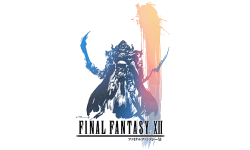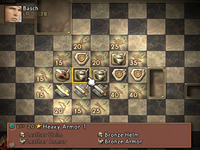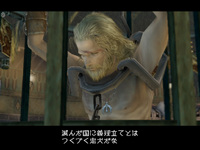|
|

|
BATTLE SYSTEM
|

|
INTERACTION
|

|
ORIGINALITY
|

|
STORY
|

|
MUSIC & SOUND
|

|
VISUALS
|

|
CHALLENGE
|
Easy to Medium
|
COMPLETION TIME
|
45-100 hours
|
|
OVERALL
4/5
|
Rating definitions
|
|
|
Final Fantasy XII returns to the world of Ivalice and brings the series back to its single-player roots after it diverted with the online Final Fantasy XI. Certainly, fans had high hopes for this game with a long four years in development and such a long time passing since the last single-player Final Fantasy, but it has also been controversial with its significant departure from the traditional Final Fantasy battle system. Fans now have the opportunity to see how this game measures up to the expectations, and while there is a lot of good news, it comes with some measures of bad news as well.
Final Fantasy XII uses a real-time battle system much different from those of its single-player predecessors with battles fought on the open field as opposed to having a transition to a separate battle screen. The player controls the movement of one character and can issue commands to all three characters in the party. The game gives players the ability to vary the amount of control they need to exercise during the game. With the use of the gambit system, one can largely sit back and watch battles progress without issuing any commands except when the fight turns against the party. Gambits can be set up and activated or deactivated for each character, allowing one to control as many characters as he or she wishes, though in all practicality, the interface is not well-designed for micromanagement, and trying to control all three characters is likely to be awkward.
While real-time systems are new to single-player Final Fantasy games, this system doesn't feel significantly different from other real-time systems seen in other games such as Star Wars: Knights of the Old Republic, Dungeon Siege, and the SNES version of Shadowrun. Whereas none of these games had a gambit system and required you to control the main character, these battle systems still usually weren't very involved as the characters would continue to attack if given no other commands. These systems tend to start out strongly, feeling fast, fluid, and the rewards seem to come quickly, but they have a distressing tendency to set a course from these wonderful shores to the dark coast of utter tedium later in the game, largely due to the much higher maximum hit points of enemies making battles drag on. Even worse, the more one is exposed to such systems, the stronger the wind that propels one into this darkness.
Final Fantasy XII doesn't escape this trap. While it does present challenging bosses unlike KOTOR, this is largely just because it doesn't rely on d20 mechanics at the core of its battle system. Sadly, there's little need for variety of tactics; virtually every boss in the game can be defeated by attacking and aggressively using curative magic and items. Mist quickenings and esper summoning can be used to speed up these long battles. Also, bosses often have special attacks that invoke an FMV sequence and essentially pause the battle for several seconds which are very disruptive to the flow of the system. Most of a player's interaction with the battle system is curing status conditions and reviving fallen characters. The former is needed a lot during the later parts of the game, which isn't good because these battle systems do tend to be enjoyable in something of a mindless state, and this tends to shake one loose from such a state.
The license board mechanic can make this even worse as it allows near-complete customization of character abilities and development so one can easily end up with cookie-cutter characters. While characters do gain levels, their abilities and the equipment they can use is determined completely by the licenses gained on this board by spending the license points gained from defeating enemies. It even has a profound effect on the character's HP, damage-dealing ability, and MP use through use of the "augment" portion of the board. One of the problems with this board, however, is that one cannot see tiles that aren't adjacent to those already gained, and while the board is generally straightforward in its layout in the beginning, one can end up having trouble finding a necessary tile later in the game. This can be especially troublesome at times since licenses are needed to equip weapons and armor, and the weapons portion is especially bad for having different types of weapons scattered around its portion of the board. This can make shopping something of a real chore. In the end, it seems a bit of overengineering. It is difficult to see any advantage of this license board compared to simpler systems such as skill trees or levels, unless one considers a bit of obfuscation an advantage. Since character customization and advancement is usually one of the most enjoyable parts of these battle systems, the inability to see most of the tiles is somewhat frustrating.
 Permits aren't good enough. You must have a license.
Permits aren't good enough. You must have a license.
|
|
The music is one of the high points of the game with many exceptional tracks, and the voice acting in the game is largely stellar. Some have reported experiencing odd variations of volume in some cases, though none were experienced by this reviewer. There is one area where the sound effect for the footsteps is rather high-pitched and unpleasant to the ears, but otherwise, the sound in the game is quite good. The game is also very visually appealing in general, though it can take a while to see some of the more appealing sights since one spends a great deal of time in desert terrain at the beginning. The cities seem rich with life and activity, and it does provide for a good ambience as one progresses through the game.
Final Fantasy XII is one of the more difficult Final Fantasy games to come out in some time, yet even most boss battles won't require any repeat attempts. There are also some times when one's party will draw the attention of too many enemies and have a difficult fight on their hands, but these situations aren't terribly common and one can always run away. Players who progress quickly through the game's story without any exploration or grinding of enemies for experience or money could probably finish the game within 45 hours and possibly even less, but most players will probably finish in 50 hours or more, especially if one spends any time hunting marks, the optional enemies scattered throughout the game.
The interface is well-designed for the most part, though there are some annoying issues. The fact that the X button is used both to open the battle menu and interact with people and objects can be annoying, as one needs to stand in the right place to interact, so one often opens the battle menu by mistake. Conversely, if one is standing in that spot, one often interacts with a nearby object instead of opening the battle menu. The camera behavior and controls are another annoying issue. The camera doesn't turn with the characters until they've turned about 45 degrees, often leaving the camera in a bad position unless one turns in wide arcs and keeps turning until the camera is pointed where desired. One can control the camera with the right analog stick, but unfortunately, the X and Y axes are inverted and this cannot be changed in settings. One can adapt to these problems over time, though.
 Yeah, and you thought you had a bad day...
Yeah, and you thought you had a bad day...
|
|
The game's localization is very well-done, and the dialogue is very well-written. The story is also quite compelling, though it starts slowly and seems very unoriginal through much of the game. While it does present some very original and significant twists, there are a disturbing number of strong similarities to a very famous science-fiction franchise which make it difficult to grant it a high originality score. That said, when the threads of this story start to come together toward the end, it is very interesting. Unfortunately, the story in this game is meted out like water from an eyedropper into the mouth of a dehydrated man for a very long time, and character development is somewhat underdone, but these characters do definitely have their moments. The game's focus is definitely on its overall plot, so it's unfortunate that it takes so long for its potential to shine through. Still, one can look forward to some interesting political intrigue and backstabbing until the true heart of the story is revealed.
Fans looking for a true masterpiece in Final Fantasy XII are likely to experience some disappointment. While it has a battle system that will likely seem fresh and exciting to many console gamers who haven't experienced one like it before, there is a good chance they'll start to find it boring and unsatisfying by the time they reach the end of the game. Fortunately, by this time, the excellent story should have picked up some momentum and will hopefully carry fans through these otherwise dull final portions of the game. In the end, it falls somewhat short of the hopes that were put on it, but those hopes were particularly high. Despite the problems, the many high points in the game make it a fun play even if it does disappoint some.
Review Archives
|









